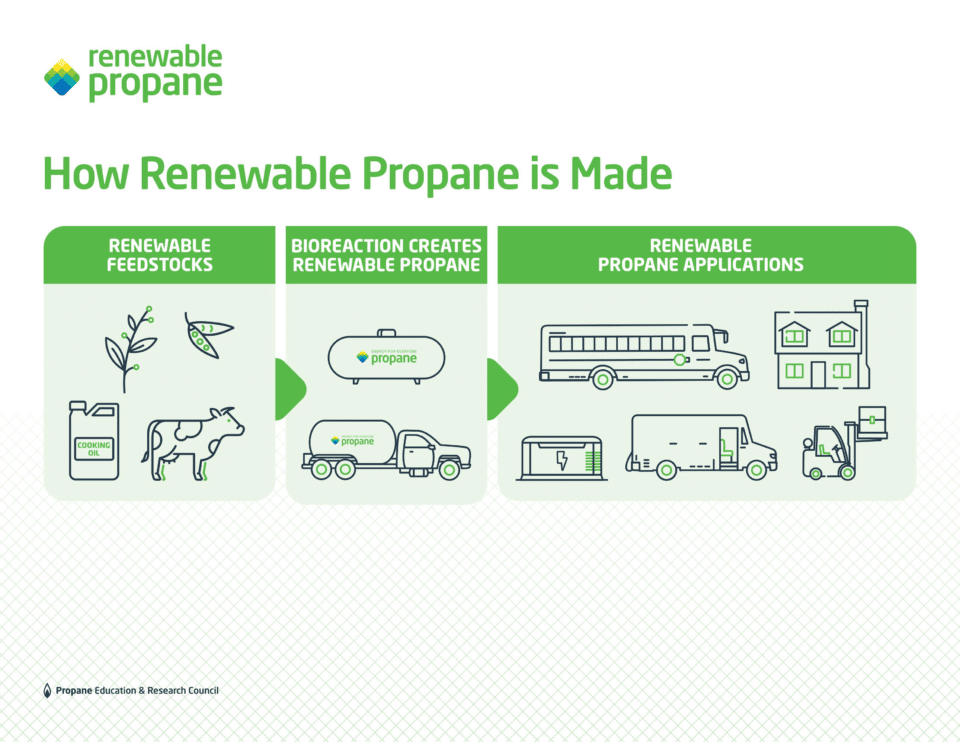April 19, 2022 – Agricultural, Propane Answers, Safety
Any time you can stretch a little more use out of something is a win. You can make soil from composted table scraps and use coffee grounds as a skin scrub. And luckily, the fuel industry has found a way to make propane from sustainable sources in addition to traditional fossil fuels.
Solar power and wind power may first spring to mind, but fuels that have long been considered unsustainable have been entering the arena.
Renewable propane (also known as biopropane) is created from a blend of sustainable materials and waste residues – think farm waste, cooking oil, and the fat from meats. If these things exist anyway, why not process them into something else useful? The energy industry has found a way to do just that.
And it burns at the same rate as traditional propane — but even lower carbon emissions.
Renewable propane is often the co-product of biodiesel production, which goes through a similar process to be made. It’s very much a two-birds-one stone scenario, with very little going to waste.
The process of doing this is called hydrogenolysis. It’s a process in which feedstocks – the base ingredients for propane production are combined with hydrogen and then purified for safe use. What would otherwise be wasted can be given a second life as a renewable energy source, fueling and heating our homes, businesses, and vehicles.

This is different from the process of traditional propane because it’s made from naturally occurring materials, as opposed to traditionally produced propane, which is a byproduct of natural gas manufacturing. (Crude oil is also a source, but it’s being phased out.)
It’s worth noting that propane is still a by-product in all iterations, whether from sustainable materials or gas. That’s one of the reasons it’s considered a green fuel. No matter what, propane is always created by taking what would otherwise be wasted and using it.
So how much of all propane is renewable at this point? It is a small, but growing, subset.
There are specifically renewable plants in operation worldwide, with more currently under production. In Europe, the Neste Corporation is producing biopropane as a co-product of renewable biodiesel, both for use in transportation.
In the United States, the energy company Phillips 66 is converting a California oil refinery into a renewable fuel plant, which will produce renewable propane and renewable biodiesel, among other things.
Then there’s the Renewable Energy Group plant in Geismar, Louisiana, a 75-million-gallon renewable refinery. There’s also AltAir in Paramount, California, which produces biopropane and commercial-grade, sustainable jet fuel.
There are signs that these new, renewable fuels could make genuine environmental changes. Propane already has the advantage of being a clean-burning fuel, releasing very little carbon monoxide into the atmosphere.
Combining that with sustainability creates massive potential for cleaner air, and people are taking notice. The vehicle industry has recently certified new technology for low nitrogen oxide heavy-duty engines made to use with propane.
New resources are constantly developing. The industry is exploring energy resources and making alternative fuels and green power a priority. Renewable propane is being recognized as an excellent way for us to reduce landfill waste and carbon output.
It’s just another way that the energy industry is evolving and helping to create a cleaner, greener world.
I would like to buy renewable propane. How do I get it?
Hi, BIll! Production in the U.S. is just beginning to spread. Even in its non-renewable form, propane is still an eco-friendly fuel (you might be interested in reading this post to learn more!) We’re happy to take care of your propane needs now, and as a customer, we’ll definitely keep you posted on the availability of renewal propane! Get in touch to get started!